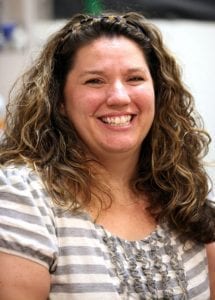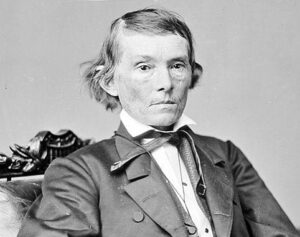
Congratulations to MAHG Student Nancie Lindblom on Winning Arizona Teacher of the Year!
Nancie Lindblom, Arizona Teacher of the Year
Nancie Lindblom believes the study of American history can inspire positive civic action. On the walls of her classroom at Skyline High School in Mesa, Arizona, she has hung three simple exhortations: “Take a stand,” “Use your voice,” and “Make a difference.” Around each slogan she has grouped photos of American historical figures. “Not all of them are presidents,” she says. Many are humbler figures, people such as any of her students may aspire to become.
Named in November as Arizona’s Teacher of the Year, this teacher of AP US history and American government is a third-year MAHG student. She decided to pursue a Master of American History and Government at Ashland because the program combined a teacher-friendly schedule with the content focus that would strengthen her knowledge base for the classroom.
Nancie was named Arizona Teacher of the year by the Arizona Education Foundation in a thorough selection process that involved a lengthy written application, an hour-long interview, and a visit to her classroom by a camera crew who not only recorded her teaching but also interviewed the students and administrators she works with. Both students and administrators say they are inspired by Nancie’s energetic teaching style.
She has been engaged in this work for 17 years, ten of these at the high school level. When she began teaching, at Brimhall Junior High School in Mesa, she at first worried that she may have contracted a serious illness, she said, because she returned home each evening thoroughly exhausted. Soon she figured out that the teaching profession simply demands a maximal daily output of energy.
Accepting the award, Nancie agrees to serve during 2013 as an advocate for the teaching profession, speaking before professional, business, civic, educational, parent, and student groups throughout the state. As one of 52 state, District of Columbia, and US territory Teachers of the Year, she will attend national education conferences, meet with President Obama in the Oval Office, attend Space Camp in Huntsville, Alabama, and be considered for the honor of National Teacher of the Year, a role that entails a year of full-time education advocacy. The National Teacher of the Year program—of which the Arizona Teacher of the Year program is a part—is the oldest and most prestigious American teacher recognition program. It is a project of the Council of Chief State School Officers, a nonprofit organization located in Washington, D.C.
In her teaching, Nancie sees her immediate role as conveying the content knowledge of history while preparing the juniors and seniors in her AP history and government classes for college. But this preparation is also life-preparation: “I have to put rigor into the classroom, guiding students in analytical writing and critical thinking. They must form their own opinions and back these opinions up with facts and analysis. I hope to teach them problem-solving skills that will help them be successful in their lives.”
Nancie uses primary texts as much as possible in her history and government classes. The MAHG program has helped a great deal with this. “Every class I have ever taken there has provided primary material for my teaching. We leave each course with a binder of primary sources. The program also sponsors a great website, TeachingAmericanHistory.org, with links to other documents.”
Nancie was interested in the MAHG program for several years before she enrolled in it. “I randomly audited a MAHG course on the Supreme Court and had a good experience, but I didn’t know how I could afford the program. So I started looking at Arizona State University’s MA program in history. I didn’t like it; it was focused on historical research, and I wanted a program that would help me as a teacher. Then I learned about theTAH grant program and received a grant to take the Progressive Era course. When I saw that the grant could pay for the graduate credit, I realized the program could work for me. I applied for the Madison Fellow program with my fingers crossed, and was selected in 2011.” While the Madison program covers tuition, room and board, “I cover the cost of travel to Ashland. To me it’s worth it. The program makes me a better teacher because of the resources it provides, the historical content knowledge I gain, and the community of teachers I tap into.”
Nancie values the “community of teachers” who participate in MAHG courses. She finds she meets them elsewhere: “This past summer at the James Madison Fellow program at Georgetown, probably a third of those participating were Ashland students. In 2011, when I attended the last of the Ashbrook sponsored Presidential Academies, many of those teachers were Ashland students as well. It is great to make connections with all these teachers. We use social networking to stay in touch, and when acceptances go out for such programs as the seminars on the Ratification of the Constitution, Ashland students are checking with each other to see who will be attending. I met a woman in the Presidential Academy I was able to meet up with again at the (Ashbrook sponsored) Ratification seminar in Boston, so I went sightseeing with her while there. This spring I’ll be traveling to Springfield, Illinois for a conference on Lincoln,and I’ve already learned that I’ll see a MAHG friend there.”
“A friend in Arizona asked me, when I told her I was traveling to Ashland for a summer seminar, if I had arranged to room with a person I liked. ‘What if you get stuck with a person you can’t talk to?’ she wanted to know. I told her we do not have a problem with that in the MAHG program! You know automatically that you all share the same passion for teaching history and for learning about the founding of American government.”
The summer schedule of the original MAHG program appealed to Nancie, whose teaching year is very busy. As an AP teacher, she spends most evenings grading student essays. But “at the same time I can’t spend four weeks every summer at Ashland,” so she has enrolled in the new online courses, taking Professor Ken Masugi’s course on Tocqueville’s Democracy in America. “Studying face-to-face with the professor is obviously best, but this online format allows us to study face-to-face through the computer. I’ve never been successful at the usual online format, because I really need the classroom interaction.” In the webinar format, “we can share opinions and hear what others have to say.”
Nancie hopes to finish her MAHG coursework this summer and begin a capstone, so as to graduate in December 2013. Given this goal, and her ambassadorial duties as Arizona Teacher of the Year, she faces a challenging and exciting year.



